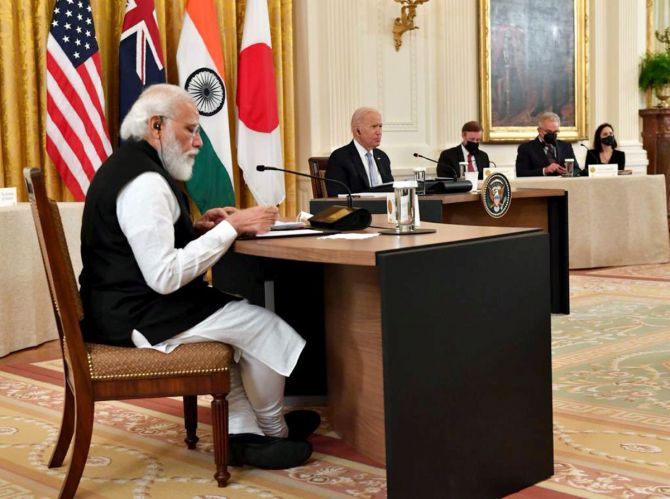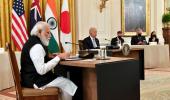This visit has ended on a vastly different note in comparison with Modi's previous visits.
Call it a rebuke, call it a censure, call it a distancing from Modi, the sharp message would have gone home, observes Ambassador M K Bhadrakumar.

Given the state of the Indian media today, it is difficult to cut through the Indian-American rhetoric from a distance of 10,000 kilometres and get a rounded view of Prime Minister Modi's visit to the United States and his meeting with President Biden.
So much has changed since Modi last visited America two years ago.
India has changed, America has changed and the world has changed.
Modi himself has had a makeover. This is not the boisterous politician we saw who electrified the Madison Square Garden or went on a victory lap with Trump at Houston.
It has been a sobering two years. India's economy crashed and it cannot be the magnet anymore for investors in Silicon Valley.
'Make in India' withered away. The current pitch for a spot in the global supply chain is unconvincing.
Indians have gone through an unprecedented scale of suffering through the pandemic.
The emblematic images of the castaway corpses on the banks of the Ganges tarnished the Indian narrative.
America too witnessed cataclysmic events that shook the very foundations of its democratic superstructure and exposed the deep cracks in its society and polity.
There is extreme polarisation. The trajectory of transition remains uncertain and might even return back to Donald Trump by 2024 or someone of his ilk.
Meanwhile, the world situation has transformed phenomenally.
The overall trends accelerated thanks to the pandemic -- principally, China's rapid ascendance as superpower, America's decline as world hegemon and the consequent shift in the world order.
The 'unipolar moment' has become a footnote in current history and there is an extremely high degree of volatility in the international system due to the US' reluctance to concede the inexorable shift in the global power dynamic.
It is against such a dramatic backdrop that Modi's return to the US after an epochal gap of two years needs to be assessed.
This has been a challenging visit for Modi. The most crucial aspect must have been the way Biden sized him up.
Biden is a far more experienced statesman than Modi, and his diplomatic track record is manifold Modi's -- nearly half a century old.
What made this occasion particularly challenging was that there was no scope for 'hug diplomacy'.
Aside the photo-ups, you could entrap the victim in a tight ring of bonhomie and mellow him somewhat before sitting down to hard talk. But coronavirus disallows wanton 'huggery'.
Which meant, diplomacy had to be conducted in the traditional way -- patient listening, exchange of views, explanations and discussions, consensus-making and so on.
The spin doctors in the Indian establishment claim that Modi-Biden 'bilateral' lasted for 90 minutes (which was, by the way, the exact duration of Biden's phone conversation with Chinese President Xi Jining on September 9).
But Biden is at a point in his chequered political career where he will roll up sleeves and get down to the nitty-gritty with only two world leaders -- Xi Jinping and Vladimir Putin.
He must conserve energy at such age (he will be 79 on November 20).
Modi possibly couldn't have had talking points to engage Biden's attention span for 90 minutes.
There's hardly anything happening in the US-Indian relationship.
Biden expressly advised Modi against answering questions from the American media, which he noted wryly, is not as cooperative and well-behaved as the Indian media.
Therefore, all we are left with is the document on the White House Web site titled US-India Joint Leaders' Statement: A Partnership for Global Good (external link), which is neither quite a joint statement nor the stuff of media briefing, but more of a declaratory nature of the sort that world leaders resort to for projecting their 'visionary' outlook when they have little to announce as concrete outcome of their parleys.
So, we get more of the same -- Covid-19, public health, vaccine, climate change, UN reform, NSG, cyber security, space, etc.
The only point where Biden appears to have bestirred himself to say something was in regard of US-Indian defence ties.
Biden 'reaffirmed the strength of the defence relationship... and the unwavering commitment to India as a Major Defense Partner through close defence engagements in information sharing, sharing of logistics and military-to-military interactions, strengthening cooperation in advanced military technologies, and expanding engagements in a multilateral framework including with regional partners.'
The reference to 'expanding engagements in a multilateral framework' is worrisome.
Biden can spring nasty surprises. French President Emmanuel Macron would know.

The salience of the Joint Leaders' Statement is, of course, that the US has brilliantly succeeded in fastening India to its cart apropos the Taliban government.
It goes to the credit of Secretary of State Antony J Blinken that so soon after leaving Delhi in the lurch to write off its $3 billion investments in Afghanistan, he got Extrenal Affairs Minister Subrahmanyam Jaishankar to sheepishly get back into the American cart.
Basically, the two foreign ministers are desperately in need of each other's company, facing stark isolation in the region.
But this Afghan journey is risky and can land India in an even bigger mess, once the US shifts gear to deploy the geopolitical tools to destabilise Afghanistan's neighbouring regions.
Consumed with a zero-sum mindset via-a-vis Pakistan and China, the Modi government has lost a sense of direction.
Strangely, the Joint Statement has ignored the 'value-based' India-US relationship.
It says nothing about shared values or about India's flourishing democracy.
This is astounding, as Biden is a world champion on human rights and democracy and should have had some nice words for Modi's stewardship.
But then, the Indian media quoted Biden as underlining to Modi that the US-Indian partnership is about 'a shared responsibility to uphold democratic values' and the two countries' 'joint commitment to diversity'.
Biden went on to recall that next week marks Gandhiji's birth anniversary.
He underscored to Modi that the message of 'non-violence, respect, tolerance matters today maybe more than ever.'
Biden made sure the Indian audience would appreciate his empathy.
These remarks came after Vice-President Kamala Harris had spoken to Modi in public about the importance of democracy when she said, 'it is imperative that we defend democratic principles and institutions within our respective countries.'
To be sure, this visit to the US has ended on a vastly different note in comparison with Modi's previous visits during the two US administrations of Presidents Barack Obama and Trump.
Call it a rebuke, call it a censure, call it a distancing from Modi, the sharp message would have gone home.
The great irony is that all this while, the democratic values were supposed to be the cementing factor in the India-US relationship -- and more important, that it was, in ideological terms, the raison d'etre of the QUAD itself.
The Modi government wouldn't have bargained that the Sword of Democracy is double-edged and can also come to haunt those who preach it cavalierly without themselves practising it.
Ambassador M K Bhadrakumar, who headed the Pakistan-Iran-Afghanistan desk at the ministry of external affairs in the 1990s, served the Indian Foreign Service for 29 years.
Feature Presentation: Aslam Hunani/Rediff.com










 © 2025
© 2025